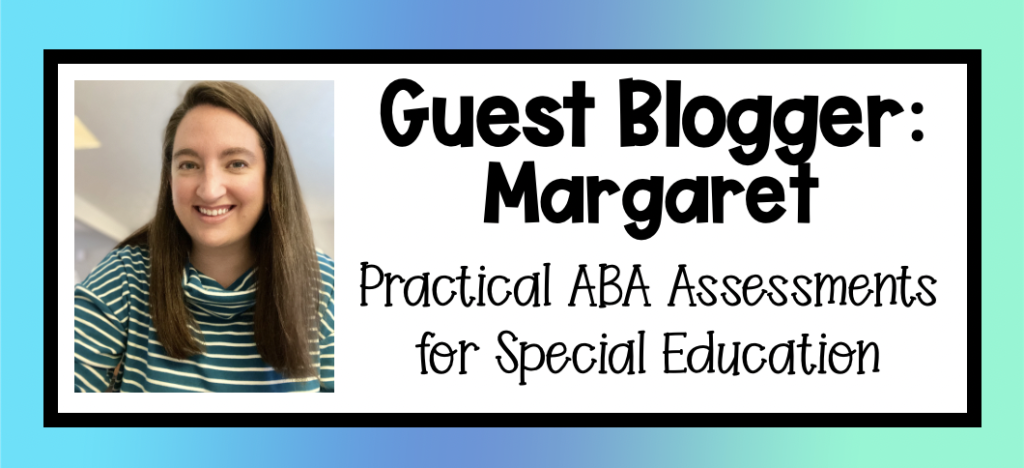I’m excited to introduce this week’s guest blogger – Margaret from Puzzled Peg to talk all about practical ABA Assessments for special education classrooms and individuals with disabilities!

Assessments measure current levels of our students and assist in treatment planning. These assessments are used in ABA settings. However, they can also be implemented in classroom environments. Here is a brief overview of 6 practical assessments.
Make sure to check out Heather’s assessment here!
First, The VB-MAPP is an assessment that evaluates language skills. This assessment is given to students from 0 to 4 years of age. Furthermore, this assessment focuses on early receptive and expressive skills.
To continue, The VB-MAPP consists of five different parts: The Milestones Assessment, Barriers Assessment, Transition Assessment, Task Analysis and Skills Tracking, and Placement and IEP Goals.
In addition, the Milestones Assessment includes milestones spread across 3 different developmental age levels – 0-18 months, 18 to 30 months, and 30 to 48 months.
The milestone areas include:
To learn more: https://avbpress.com/
The Essential for Living is a communication, behavior, and functional skills assessment and curriculum. This assessment is appropriate for both children and adults with moderate to severe disabilities. This assessment contains over 3,000 different skills. In addition, it can be useful for students with limited communication, minimal daily living skills, or severe problem behavior.
The Essential for Living has a Quick assessment portion that is easy to administer. This acts as a starting point for creating future goals. These skills are organized in 4 different categories including must have skills, should have skills, good to have skills, and nice to have skills.
Covers the following domains for ABA Assessments:
To learn more: https://essentialforliving.com/
The PEAK Relational Training System is an assessment. It is also a curriculum for teaching basic and advanced language skills. There are 4 different modules that reflect four different ways of learning new skills and is appropriate for children and adolescents from 1 to 16+ years of age.
Finally, the Direct Training module focuses on language skills. The Generalization module takes the Direct Training promotes generalization of early skills.
To learn more: https://www.peak2aba.com/
The Assessment of Functional Living Skills (AFLS) is an assessment that is used with children, adolescents, and adults. The goal of the AFLS is to create a path of independence. In addition, there are currently 6 different assessment protocols including:
Finally, each skill area is scored on a scale of 0 to 4 points based on criteria. The AFLS is a comprehensive assessment that is easy to understand.
To learn more: https://functionallivingskills.com/

The Early Start Denver Model or ESDM, is for small children from 12 to 48 months of age. The ESDM is a relationship-based intervention. This involves parents and families as an integral part of the assessment. Furthermore, it focuses on social-emotional, cognitive, and language abilities through a play-based approach.
Therefore, this assessment includes a curriculum checklist that covers:
To learn more: https://www.esdm.co/
Finally, the Social Skills Improvement Scale or SSIS is a rating scale. It is used to measure social skills, problem behaviors, and academic competence. However, the assessment is for students 3 to 19 years of age. It involves 3 different rating skills. In other words, these are filled out by a teacher, parent, and/or student.
To learn more: https://pearsonclinical.in/solutions/social-skills-improvement-system-ssis-rating-scales/
In conclusion, make sure to check out how to assess student growth in the classroom!
What are you looking for?
COPYRIGHT © 2025 Full SPED Ahead